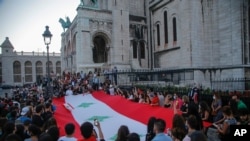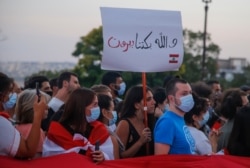The massive explosions in Beirut that killed more than 130 people and injured thousands is triggering an outpouring of aid and support from across the world, and especially among the Lebanese diaspora. One of the largest communities is in France, where many are watching events in their troubled homeland with growing concern.
In the heart of Paris, Our Lady of Lebanon cathedral is a place to gather for celebrations and important events for the Lebanese diaspora. Today, many here are trying to make sense of the tragedy in Beirut.
A priest, Father Fadi el Mir, told VOA he is still processing the enormous shock created by this tragic explosion. He said he received many videos from Beirut and still cannot fully express with words his despair and pain.
Karim Sfeir is a 21-year-old student originally from Byblos, some 75 kilometers from Beirut. Luckily for him, his family is safe but he has many friends who are in need. He has been checking his phone constantly since the explosions.
He explained everyone is monitoring the situation and talking about what happened on social media like WhatsApp.
In Beirut, an estimated 300,000 people lost their homes after the deadly blasts. In Paris, the diaspora is rushing to help by sending money and organizing donations to assist those in need in the motherland.
Father Fadi El Mir says several charities in Paris are raising money for Lebanon. The effort will go on to help those in distress there. Besides being abroad, he says his roots are still in Lebanon.
On Wednesday, people gathered near the Sacré-Coeur Basilica in Paris with red and white Lebanese flags. They paid tribute to the victims and also reflected on Lebanon’s future.
What happens next? What will come out of this crisis for a country already struggling under an economic collapse before the catastrophe?
The immediate humanitarian assistance is a need to be met but some wonder how the country can recover after such a tremendous loss.
Jinane Chaker-Sultani MIlalli, a well-known Lebanese, anthropologist, said she regrets that Beirut’s harbor was destroyed as were wheat stocks. She explained that the port was the only option for Lebanon to do trade abroad so, to her, the real question is: how the country can survive after these two explosions knowing that Lebanon is already facing an economic and political crisis.
Officials at the Lebanese Embassy in Paris say as many as 120,000 Lebanese citizens currently live in France.






